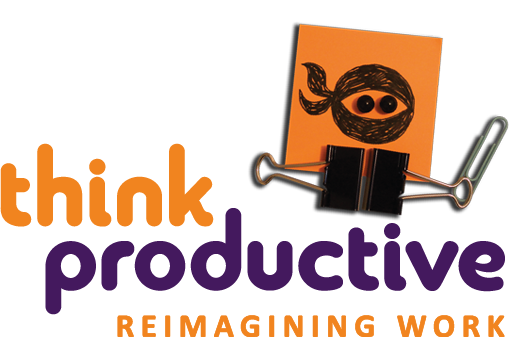Think Productive runs a number of workshops on different aspects of personal and team productivity, from how to become a Productivity Ninja and run great meetings, through to email etiquette and team collaborations. But the workshop that sells more than any other is all about tackling the email inbox – it’s called ‘Getting Your Inbox to Zero’.
The term ‘inbox zero’ was first coined by a blogger called Merlin Mann, who gave a talk on the subject at Google as well as writing about email habits on his blog, 43folders.com. The video of that talk at Google went viral, and over the last few years productivity enthusiasts, app developers and whole organizations have become obsessed with the idea of getting their inboxes to zero. It’s not difficult to think about why having zero emails is a compelling thing. For some, it’s a daily practice, for others a summit never reached. There has even been a little bit of backlash, from people saying things like: ‘Why do I care about getting my inbox to zero anyway?’
In this blog post, I’m going to talk about why keeping your inbox at zero matters – after all, email is not your job, it’s a medium through which the real stuff happens.
Merlin Mann is the originator of the term ‘inbox zero’. For many years, his blog, 43folders.com, has been one of the most popular productivity blogs in the USA. His weekly podcast, ‘Back to Work’, can be found on iTunes.
The real goal of inbox zero
In the workshops that we run at Think Productive, we see the effect that getting your inbox to zero – usually for the first time since day one in the job – can have on people. Their shoulders relax, they have more of a smile on their face and there’s a visible sense of relief, of calm, of having achieved something. It can be truly euphoric when people first see white space and an infinite nothing where they used to see a huge mountain of unwanted rubbish and inarticulate demands.
But while it’s truly satisfying to reach ‘the end’ of email (even if it’s only temporarily ‘the end’ until someone sends you another email), reaching ‘the end’ is not what makes inbox zero a powerful mindset and habit.
The real reason to get your inbox to zero is to free your mind from thinking about email and to spend less time in your email inbox. Reaching zero emails regularly eliminates distraction, reduces stress and helps clarify what tasks you might still have left to do. Because even when you reach inbox zero, there’s still work to do – in fact, it’s where the real work begins. There are still conversations to have, ideas 73to mull, problems to solve and politics to navigate. It’s just that when your inbox is at zero, you can see these things more clearly as you’ll have sorted out in your own mind or on your to-do list what the result of that mountain of emails actually amounts to in the real world. It’s no longer a huge source of discomfort and distraction. It even means you can turn your Outlook or Gmail or Mail app off for a while and do something else.
I don’t write with my email inbox turned on in the background. Sometimes I will try even though I know it’s a bad idea and end up having a bad productivity day as a result (we’re all human!). Deep down, we all know that email is a tool where latest and loudest always trumps the most vital.
Think about how many times today or this week you’ve been interrupted from what you were doing by a new email landing in your inbox or a notification on your phone. Out of those times, how many were the most important piece of information you received that day? You get the idea.
Find out more about our productivity training and time management workshops on our website: www.thinkproductive.co.uk

